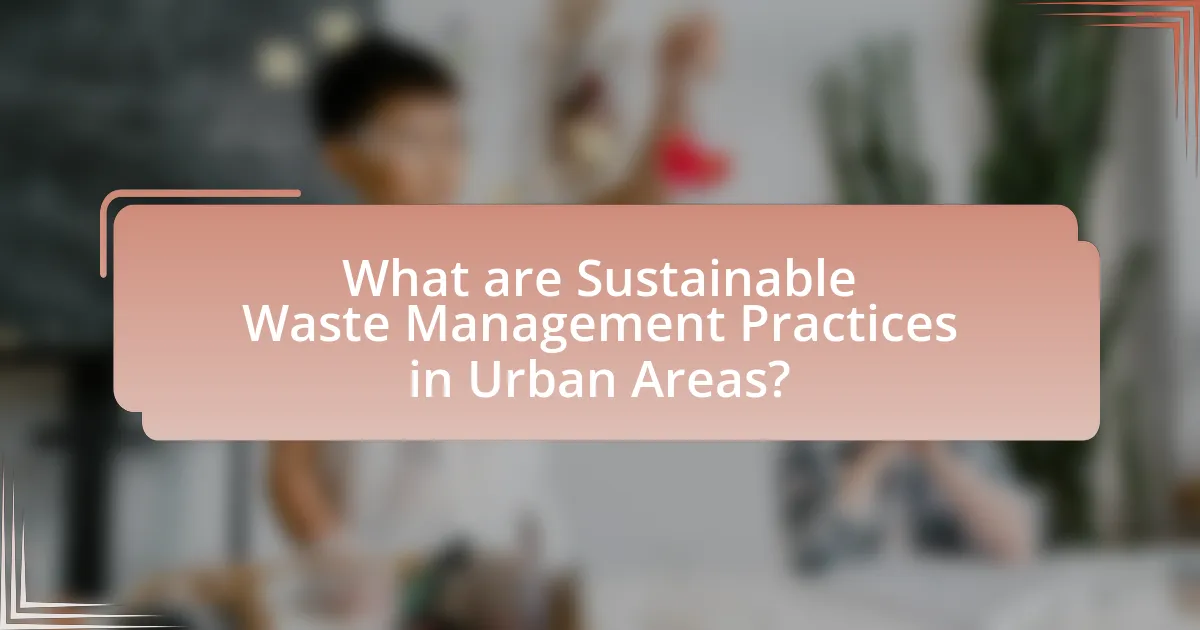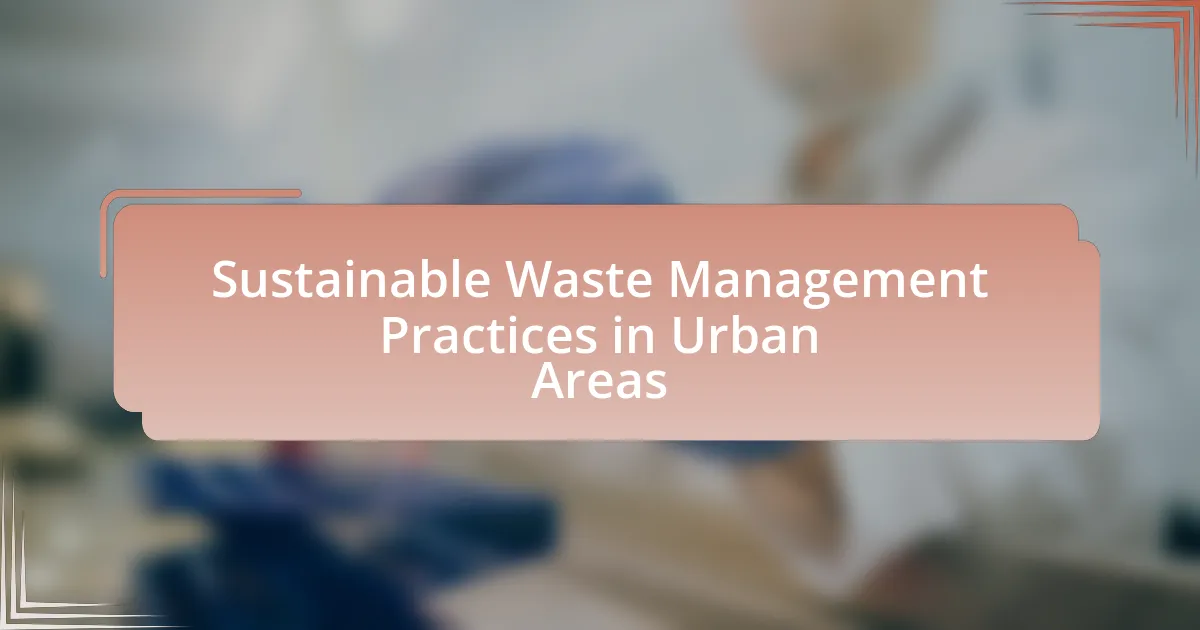Sustainable waste management practices in urban areas encompass strategies such as recycling, composting, waste reduction, and waste-to-energy technologies. These practices aim to minimize landfill waste, conserve resources, and reduce pollution, thereby contributing to environmental sustainability. Key principles include waste reduction, reuse, and responsible disposal, which urban areas implement through comprehensive programs and community engagement. The article also highlights the social and economic benefits of sustainable waste management, the challenges faced by urban areas, and successful case studies that demonstrate effective strategies. Additionally, it discusses the role of innovative technologies and data in enhancing waste management efficiency and offers best practices for residents to engage in sustainable efforts.

What are Sustainable Waste Management Practices in Urban Areas?
Sustainable waste management practices in urban areas include recycling, composting, waste reduction, and the implementation of waste-to-energy technologies. Recycling programs enable the recovery of materials like paper, glass, and metals, reducing landfill waste and conserving resources. Composting organic waste transforms it into nutrient-rich soil, minimizing methane emissions from landfills. Waste reduction strategies, such as promoting reusable products and minimizing single-use plastics, directly decrease the volume of waste generated. Additionally, waste-to-energy technologies convert non-recyclable waste into energy, providing a renewable energy source while reducing landfill dependency. These practices collectively contribute to environmental sustainability and resource conservation in urban settings.
How do these practices contribute to environmental sustainability?
Sustainable waste management practices in urban areas contribute to environmental sustainability by reducing landfill waste, conserving resources, and minimizing pollution. These practices, such as recycling, composting, and waste reduction initiatives, divert significant amounts of waste from landfills, which helps decrease greenhouse gas emissions associated with waste decomposition. For instance, the Environmental Protection Agency (EPA) reports that recycling and composting prevented the release of approximately 186 million metric tons of carbon dioxide equivalent into the air in 2018. Additionally, sustainable waste management promotes the efficient use of materials, leading to less resource extraction and energy consumption, further supporting ecological balance.
What are the key principles of sustainable waste management?
The key principles of sustainable waste management include the reduction of waste generation, reuse of materials, recycling, and responsible disposal. These principles aim to minimize environmental impact and promote resource efficiency. For instance, the waste hierarchy prioritizes prevention and reduction over recycling and disposal, emphasizing that reducing waste at the source is the most effective strategy. According to the United Nations Environment Programme, effective waste management can significantly reduce greenhouse gas emissions and conserve natural resources, demonstrating the importance of these principles in achieving sustainability goals.
How do urban areas implement these principles effectively?
Urban areas implement sustainable waste management principles effectively through comprehensive recycling programs, waste reduction initiatives, and community engagement strategies. For instance, cities like San Francisco have achieved a diversion rate of over 80% by mandating recycling and composting, thereby minimizing landfill waste. Additionally, urban areas often utilize technology, such as smart bins and waste tracking systems, to optimize collection routes and reduce operational costs. These methods are supported by policies that promote public awareness and participation, ensuring that residents are informed and motivated to engage in sustainable practices.
Why is sustainable waste management important for urban communities?
Sustainable waste management is crucial for urban communities because it minimizes environmental impact and promotes public health. Effective waste management reduces pollution, conserves resources, and decreases greenhouse gas emissions, which are vital for combating climate change. For instance, cities that implement recycling and composting programs can divert up to 60% of waste from landfills, significantly lowering methane emissions produced by decomposing organic matter. Additionally, sustainable practices enhance community aesthetics and property values, as cleaner environments attract residents and businesses. Therefore, sustainable waste management not only addresses immediate waste disposal challenges but also fosters long-term ecological and economic benefits for urban areas.
What are the social benefits of sustainable waste management?
Sustainable waste management provides significant social benefits, including improved public health, enhanced community engagement, and increased job opportunities. By reducing waste and promoting recycling, communities experience lower pollution levels, which directly contributes to better air and water quality, thereby reducing health risks associated with waste-related diseases. Furthermore, sustainable practices foster community involvement through educational programs and local initiatives, encouraging residents to participate actively in waste reduction efforts. Additionally, the implementation of sustainable waste management creates green jobs in recycling, composting, and waste processing sectors, contributing to local economies and providing employment opportunities. These benefits collectively enhance the quality of life in urban areas, making them healthier and more sustainable environments.
How does sustainable waste management impact local economies?
Sustainable waste management positively impacts local economies by creating jobs, reducing costs, and promoting local businesses. For instance, implementing recycling programs and composting initiatives generates employment opportunities in collection, processing, and education sectors. According to a report by the U.S. Environmental Protection Agency, recycling and reuse activities in the United States accounted for over 1.1 million jobs and $236 billion in revenue in 2016. Additionally, sustainable practices lower waste disposal costs for municipalities, allowing funds to be redirected towards community services and infrastructure. By fostering a circular economy, local businesses benefit from increased demand for recycled materials and sustainable products, further stimulating economic growth.
What challenges do urban areas face in implementing sustainable waste management?
Urban areas face significant challenges in implementing sustainable waste management, primarily due to high population density and limited space for waste processing facilities. The concentration of people leads to increased waste generation, making it difficult to manage and recycle effectively. Additionally, inadequate infrastructure, such as insufficient collection systems and recycling facilities, hampers efficient waste management. Financial constraints also pose a challenge, as many urban municipalities struggle to allocate sufficient budgets for sustainable initiatives. Furthermore, public awareness and participation in recycling programs are often low, which limits the effectiveness of waste reduction efforts. These factors collectively hinder the successful implementation of sustainable waste management practices in urban settings.
What are the common barriers to effective waste management practices?
Common barriers to effective waste management practices include inadequate infrastructure, lack of public awareness, insufficient funding, and regulatory challenges. Inadequate infrastructure, such as insufficient collection points and recycling facilities, hampers the ability to manage waste efficiently. Lack of public awareness leads to improper waste disposal behaviors, as individuals may not understand the importance of recycling or composting. Insufficient funding restricts the development and maintenance of waste management systems, resulting in ineffective operations. Regulatory challenges, including inconsistent policies and lack of enforcement, further complicate the implementation of effective waste management practices. These barriers collectively hinder the progress toward sustainable waste management in urban areas.
How can urban areas overcome these challenges?
Urban areas can overcome challenges in sustainable waste management by implementing comprehensive recycling programs and promoting waste reduction initiatives. These strategies encourage residents and businesses to separate recyclables from general waste, significantly increasing recycling rates. For instance, cities like San Francisco have achieved a recycling rate of over 80% by mandating composting and recycling, demonstrating the effectiveness of such policies. Additionally, investing in waste-to-energy technologies can reduce landfill reliance while generating renewable energy, as seen in cities like Copenhagen, which converts waste into energy, thus addressing both waste management and energy needs.
How do different urban areas approach sustainable waste management?
Different urban areas approach sustainable waste management through a variety of strategies tailored to their specific needs and resources. For instance, cities like San Francisco implement comprehensive recycling and composting programs, achieving a diversion rate of over 80% from landfills, which is supported by strict regulations and public education initiatives. In contrast, cities such as Tokyo utilize advanced waste-to-energy technologies, converting waste into electricity while minimizing landfill use. Additionally, cities like Amsterdam focus on circular economy principles, promoting reuse and reduction alongside recycling, which has led to significant decreases in waste generation per capita. These diverse approaches demonstrate that effective sustainable waste management is contingent upon local policies, community engagement, and technological innovation.
What are some successful case studies of sustainable waste management in cities?
Successful case studies of sustainable waste management in cities include San Francisco, which has achieved a diversion rate of over 80% through comprehensive recycling and composting programs. The city implemented a mandatory recycling and composting ordinance in 2009, leading to significant reductions in landfill waste. Another example is Capannori, Italy, which has reached a 50% waste reduction rate by adopting a pay-as-you-throw system that incentivizes waste reduction and recycling. Additionally, Kamikatsu, Japan, has implemented a zero-waste policy, achieving a recycling rate of over 80% by requiring residents to separate waste into 45 categories. These cities demonstrate effective strategies that combine policy, community engagement, and innovative practices to enhance sustainable waste management.
How do cultural and economic factors influence waste management practices?
Cultural and economic factors significantly influence waste management practices by shaping community attitudes towards waste and determining available resources for waste management. For instance, cultures that prioritize environmental sustainability often engage in higher rates of recycling and composting, as seen in countries like Sweden, where over 99% of waste is recycled or reused. Economically, regions with higher income levels typically have more funding for advanced waste management technologies and infrastructure, leading to more efficient waste collection and processing systems. Conversely, lower-income areas may struggle with inadequate waste management services, resulting in higher rates of illegal dumping and littering. This relationship between cultural values and economic capacity directly impacts the effectiveness and sustainability of waste management practices in urban settings.
What innovative technologies are being used in sustainable waste management?
Innovative technologies used in sustainable waste management include smart waste bins, waste-to-energy conversion, and advanced recycling technologies. Smart waste bins equipped with sensors optimize collection routes by monitoring fill levels, reducing fuel consumption and operational costs. Waste-to-energy conversion technologies, such as anaerobic digestion and incineration, transform organic waste into energy, significantly reducing landfill use and greenhouse gas emissions. Advanced recycling technologies, including automated sorting systems and chemical recycling, enhance material recovery rates and enable the recycling of complex materials. These technologies collectively contribute to more efficient waste management practices in urban areas, promoting sustainability and resource recovery.
How do these technologies improve waste collection and processing?
Technologies improve waste collection and processing by enhancing efficiency, accuracy, and data management. For instance, the use of smart bins equipped with sensors allows for real-time monitoring of waste levels, enabling optimized collection routes and reducing unnecessary pickups. According to a study by the World Bank, cities implementing smart waste management systems can reduce operational costs by up to 30%. Additionally, data analytics tools help in analyzing waste composition, leading to better recycling strategies and increased diversion rates from landfills. These advancements not only streamline operations but also contribute to more sustainable urban waste management practices.
What role does data play in enhancing waste management efficiency?
Data plays a crucial role in enhancing waste management efficiency by enabling informed decision-making and optimizing resource allocation. Through the collection and analysis of data, waste management authorities can identify patterns in waste generation, track disposal methods, and assess the effectiveness of recycling programs. For instance, a study by the World Bank found that cities utilizing data analytics for waste management improved their operational efficiency by up to 30%, leading to reduced costs and increased recycling rates. This data-driven approach allows for targeted interventions, such as adjusting collection schedules based on real-time waste levels, ultimately contributing to more sustainable urban waste management practices.
What are the best practices for residents to engage in sustainable waste management?
Residents can engage in sustainable waste management by implementing practices such as reducing waste generation, recycling materials, and composting organic waste. Reducing waste involves minimizing single-use items and opting for products with less packaging, which can significantly decrease the amount of waste sent to landfills. Recycling helps divert materials like paper, glass, and plastics from landfills, with the Environmental Protection Agency reporting that recycling and composting prevented the release of 186 million metric tons of carbon dioxide equivalent into the air in 2018. Composting organic waste, such as food scraps and yard waste, not only reduces landfill contributions but also enriches soil, promoting healthier ecosystems. By adopting these practices, residents contribute to a more sustainable urban environment and help mitigate the impacts of waste on climate change.
How can individuals reduce waste in their daily lives?
Individuals can reduce waste in their daily lives by adopting practices such as recycling, composting, and minimizing single-use plastics. Recycling allows individuals to divert materials like paper, glass, and metals from landfills, which can significantly reduce waste; for instance, recycling one ton of paper can save 17 trees and 7,000 gallons of water. Composting organic waste, such as food scraps and yard waste, can reduce the volume of waste sent to landfills by up to 30%, while also creating nutrient-rich soil for gardening. Additionally, minimizing single-use plastics, such as bags and bottles, can lead to a substantial decrease in plastic waste, as approximately 300 million tons of plastic are produced globally each year, with a significant portion ending up in oceans and landfills. By implementing these strategies, individuals can contribute to more sustainable waste management practices in urban areas.
What community initiatives support sustainable waste management efforts?
Community initiatives that support sustainable waste management efforts include recycling programs, composting initiatives, and community clean-up events. Recycling programs encourage residents to separate recyclable materials from general waste, significantly reducing landfill contributions; for instance, cities like San Francisco have achieved over 80% waste diversion through such programs. Composting initiatives promote organic waste reduction by converting food scraps into nutrient-rich compost, which can enhance soil health; studies show that composting can reduce landfill waste by up to 30%. Community clean-up events foster local engagement and awareness about waste management, leading to cleaner neighborhoods and increased participation in sustainable practices. These initiatives collectively contribute to a more sustainable urban environment by minimizing waste and promoting responsible disposal methods.


